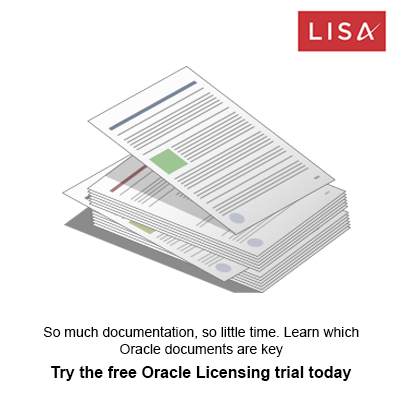Alternatives to Oracle database
It has been suggested that Oracle derives 50% of Oracle database revenue in the UK from audit activity and the Campaign for Clear Licensing has reported that “92% of customers say that Oracle does not clearly communicate licensing changes”.
https://twitter.com/itammartin/status/575373046271315969
Maybe you’ve grown bored of propping up Oracle’s flagging database business? maybe you are irritated by the continual threat of audit? Maybe it’s time to consider alternatives?
Viable Alternatives
I recently met with James Mills of TmaxSoft who sell Tibero, an alternative to Oracle database.
Tibero don’t audit customers, have a straightforward licensing program with no boobytraps, and is said to cost 50% cheaper than Oracle. So, technology challenges aside (discussed below), what a refreshing alternative.
Those seeking alternatives might also like to take a look at these lists:
Alternatives to traditional relational databases might also be considered. Patrick McFadin of Apache Cassandra at DataStax said:

Patrick McFadin of Apache Cassandra at DataStax
“There are a few different options. If you want to stick with similar, relational database technologies then the alternatives are Microsoft SQL Server, MySQL or PostgreSQL.
If you want to look at distributed storage and processing, then there are new technology options under the banner of NoSQL – this is a family of databases that are designed to work in different, workload-specific, ways. They come from problems faced by the likes of Google and Facebook – these companies developed the technologies to handle their data management issues, then open sourced the technologies.
Apache Cassandra is a good example – it was originally developed at Facebook, then became part of the Apache Software Foundation. Cassandra is now used by companies including Netflix, eBay and SONY to power their online business and massive scaling needs. Cassandra has tended to be used by web companies that need an always-on, highly scaling database. In some cases even across multiple data centers.
Cassandra can and has been used to replace Oracle DB instances in retail, finance / banking and telco services.
From a licensing perspective, open source technologies come in at around ten percent of the cost of a comparable Oracle license. This is a significant TCO advantage when looking at the speed and size of data needed to be competitive.”
Technology Challenges “Yes, but Oracle owns the stack”
Part of Oracle’s enduring stickiness is it’s ownership of the stack of technology around the database. Can we rip out Oracle and replace it with something else? or shall we keep taking the abuse and grin and bear it? This is a point Oracle and other software dinosaurs will labour during pitches and negotiations, pouring fresh ladles of FUD on alternatives.
From an ITAM and procurement viewpoint, there are three major technology and political hurdles to address:
- Convincing Oracle DBA’s that Oracle is not the only fruit and there is life, technology and career advancement beyond their collection Oracle qualifications.
- Leaning upon ISV’s, hardware manufacturers and cloud infrastructure supplliers to ensure the stack required to deliver your business applications has viable alternatives from progressive technology partners
- Address the fear of change (“We’ve always used Oracle database”, “We’ve never heard of this other company”, “will it work” and so on) – Again, something Oracle account managers will focus on.
Building the Business Case and Making the Transition

Shane McDermott, iQuate
IT Asset Management professionals can play an instrumental role in finding alternatives and scoping out the transition (and shedding a great deal of risk, headaches and anguish from an aggressive vendor in the process).
Shane McDermott of iQuate offers the following advice when organisations are considering migrating from Oracle:
“At a high level, there are three stages to making the transition:
1. Assessment
- Inventory – What is the Oracle deployment?
- Dependencies – what databases are supporting what apps and what infrastructure is it underpinning?
- Candidates – Which DBs are configured to possibly suit transfer to an alternative technology – e.g. MSQL. This requires some in depth knowledge of the database config, understanding of Oracle technical dependencies. Some candidates will move easily, others will need rework/engineering/migration plans.
- Identification – identify the new target infrastructure and associated costs (there may be several of these identified and profiled for different use cases)
- Plan – organisational dependencies, suppliers, quotes, timelines, contracts etc.
- Some can be migrated automatically, others not. Partner/supplier selection to execute and manage migration (we have some partners in this space)
3. Monitoring
- Verify business case objectives achieved, realise savings, go back and reiterate.”
Your View?
Have you a success story from moving from Oracle to share? What alternatives would you recommend? Please leave a comment below or contact me using the details below. Thanks, Martin
Can’t find what you’re looking for?
More from ITAM News & Analysis
-
Software Vendor Insights: What do the numbers tell us about the opportunities for ITAM negotiations?
What software vendor insights can be gained from the latest financial results from Amazon, Google, Broadcom, Salesforce, IBM and SAP? An important part of ITAM is paying close attention to the health of the companies we ... -
Flexera is first SAM tool vendor verified for Oracle E-Business Suite applications
Flexera has announced that it has been verified as the first software asset management (SAM) tool vendor for Oracle E-Business Suite applications. Almost anyone with an Oracle estate will be familiar with the company’s License Management ... -
ITAMantics - March 2024
Welcome to the March 2024 edition of ITAMantics, where George, Rich and Ryan discuss the month’s ITAM news. Up for discussion this month are. Listen to the full ITAMantics podcast above or queue it up from ...
